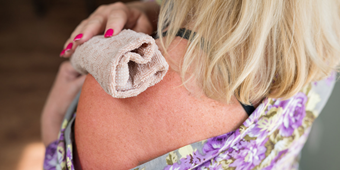'I’ve Got You Under My Skin': Allergies Triggered by Touch

Answer a few questions and we'll provide you with a list of primary care providers that best fit your needs.
Did you develop a rash after wearing a new necklace? Or break out in itchy bumps after a hike in the woods? Chances are you had contact dermatitis, which happens when you touch something you’re allergic to. Some irritants may seem obvious, like poison ivy. But you may be surprised to discover that even the priciest perfume can leave your skin red and itchy. Common causes include:

- Poison ivy
- Jewelry made of nickel or gold
- Sunscreens
- Shaving lotions
- Scented soap
- Deodorant
- Hand sanitizer
- Rubber
- Bleach
If you touch something you’re allergic to, wash the affected area with soap and water right away. Symptoms can appear anywhere from a few hours to up to 10 days after you come into contact with an irritant, which can make it tough to pinpoint what triggered the problem. Reactions can range from mild to severe, and include:
- Red, irritated skin
- Itching
- Swelling
- Bumps or blisters, which may be filled with clear liquid
- Hot or tender skin
Symptoms can appear anywhere from a few hours to up to 10 days after you come into contact with an irritant.
Treatment for Contact Dermatitis
- Medication: Your doctor or allergist can prescribe a cream, or even oral medication, to relieve the itching and heal damaged skin. Antihistamines and ointments can also help. And, as much as you want to scratch that itchy spot, don’t — or you may end up with an infection.
- Track your activities: Keep a diary of your activities and anything you think might have brought on the reaction. This can help your allergist pin down the culprit. He or she might even have you wear a patch for 48 hours to determine potential causes, like hair dye, fragrances or rubber.
- Patch testing: If you have photoallergic contact dermatitis – an irritant or allergen causes a reaction after sun exposure – patch testing can help identify what caused it. Sunscreen, shaving lotion and perfume are all possible offenders.
Answer a few questions and we'll provide you with a list of primary care providers that best fit your needs.
Source: American College of Allergy, Asthma and Immunology (acaai.org)




